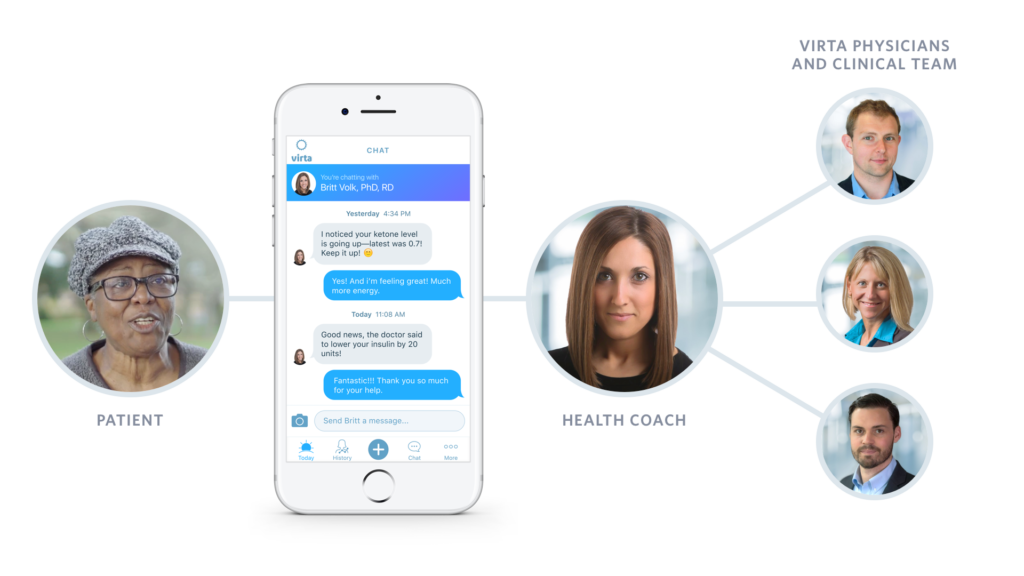Our latest investment: Welcome Virta!
Rock Health funds entrepreneurs building technologies with the potential for massive improvements to healthcare—not just incremental iterations of the status quo. That’s why we’re proud to announce our investment in Virta, an online specialty medical clinic founded by Trulia cofounder Sami Inkinen that reverses type 2 diabetes safely and sustainably, without medications or surgery.
The burden of diabetes creates a maelstrom in the lives of patients, their families, and the healthcare system. Type 2 diabetes develops when the body either becomes resistant to or stops producing insulin, the hormone that allows for the uptake of glucose. Maintaining glucose levels requires extraordinary diligence for people living with diabetes, and failing to keep blood sugar levels in check puts patients at risk of dangerous complications. Diabetes is the leading cause of kidney failure, cardiovascular disease, lower-limb amputations, and adult-onset blindness1. More than 20% of all US healthcare dollars are spent on diabetes—which doesn’t include care for the 30% of cases that go undiagnosed2. Let that sink in. Twenty-nine million—nearly one in ten—Americans are living with diabetes. Globally, that number rises to over 410M—4X more than in 1980. It’s no surprise that care costs have topped $300B per year3. We’re also seeing an unprecedented proportion of people spend nearly their entire lives with the disease, as a rise in childhood obesity has accompanied an increase in children developing the disease.
While those with prediabetes can alter their disease trajectory and the onset of the disease, diabetes itself is irreversible—or so we thought.

Virta’s technology and platform enables continuous, remote care and ongoing personalization of each patient’s treatment plan, delivered online by Virta physicians and health coaches.
Virta has conducted a nonrandomized, parallel arm, outpatient intervention study to reverse diabetes in individuals, each with their own unique biochemistries, medications, and life circumstances. Virta provides two critical services: 1) individualized metabolic management and 2) continuous remote care and ongoing personalization through both a technology platform and interaction with Virta physicians and health coaches.
Serial entrepreneur Sami Inkinen and renowned doctor-scientists Stephen Phinney and Jeff Volek drew on decades of research to support the launch of a two-year clinical trial to build Virta. We’re pleased with the early results, released today in a peer-reviewed study. After ten weeks, 87% of patients eliminated or reduced the need for insulin, 75% showed clinically significant weight loss, and patients saw a 1.1 point reduction in HbA1c levels. Trial participant retention levels remain above 90%.
We’re excited to invest in a full-stack healthcare company pursuing rigorous science wherever it leads, starting by understanding and addressing underlying causes of type 2 diabetes. By combining research with technology-enabled and human-powered medical services, and superb consumer product design, Virta’s full-stack approach enables them to “bypass incumbents and overcome cultural resistance to new tech.” Sami, Stephen, Jeff, and the entire Virta team bring a profound level of clinical rigor and seriousness to their work—and ultimately and most importantly, to the patients they serve. We couldn’t be more thrilled to have them as part of the Rock Health family.
Learn more about the science and team behind Virta’s mission to restore metabolic health in chronic disease patients.
1 Centers for Disease Control and Prevention. National Diabetes Statistics Report: Estimates of Diabetes and Its Burden in the United States, 2014. Atlanta, GA: U.S. Department of Health and Human Services; 2014.
2 Centers for Disease Control and Prevention. At a Glance 2016: Diabetes. Working to Reverse the US Epidemic. Atlanta, GA: U.S. Department of Health and Human Services; 2016.
3 Worldwide trends in diabetes since 1980: a pooled analysis of 751 population-based studies with 4·4 million participants. The Lancet, Volume 387, Issue 10027, 1513 – 1530.
